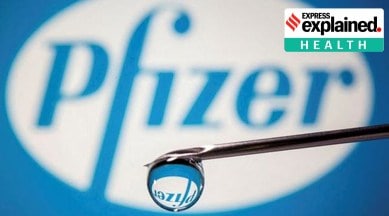Explained: Why Moderna is suing Pfizer for patent infringement over Covid vaccine
Moderna's Covid vaccine — its lone commercial product — has brought in $10.4 billion in revenue this year while Pfizer's vaccine brought in about $22 billion.

Moderna is suing Pfizer and its German partner BioNTech for patent infringement in the development of the first Covid-19 vaccine approved in the United States, alleging they copied technology that Moderna developed years before the pandemic.
The lawsuit, which seeks undetermined monetary damages, was being filed in U.S. District Court in Massachusetts and the Regional Court of Dusseldorf in Germany, Moderna said in a news release on Friday.
monthly limit of free stories.
with an Express account.
“We are filing these lawsuits to protect the innovative mRNA technology platform that we pioneered, invested billions of dollars in creating, and patented during the decade preceding the COVID-19 pandemic,” Moderna Chief Executive Stephane Bancel said in the statement. Moderna Inc, on its own, and the partnership of Pfizer Inc and BioNTech SE were two of the first groups to develop a vaccine for the novel coronavirus.
What is the technology Moderna is accusing Pfizer of copying?
Just a decade old, Moderna, based in Cambridge, Massachusetts, had been an innovator in the messenger RNA (mRNA) vaccine technology that enabled unprecedented speed in developing the COVID-19 vaccine.
An approval process that previously took years was completed in months, thanks largely to the breakthrough in mRNA vaccines, which teach human cells how to make a protein that will trigger an immune response.
What is mRNA vaccine technology?
The Moderna and Pfizer vaccines use the same technology, based on messenger RNA, or mRNA. Such vaccines make use of the messenger RNA molecules that tell the body’s cells what proteins to build.
Dr Adam Taylor, a virologist and research fellow at the Menzies Health Institute, Queensland, Griffith University, had told Reuters that mRNA enters cells shortly after vaccination and instructs them to create a SARS-CoV-2 spike protein, prompting the immune response. The immunity against a Covid infection is in the form of antibodies that will develop and remain in the blood, fighting the real virus when it infects.
Other types of vaccines include the non-replicating viral vector category, an example of which is the vaccine developed by Oxford and AstraZeneca.
How does patenting come into play here?
Germany-based BioNTech had also been working in this field when it partnered with the U.S. pharma giant Pfizer. The U.S. Food and Drug Administration granted emergency use authorization for the Covid-19 vaccine first to Pfizer/BioNTech in December 2020, then one week later to Moderna.
Moderna’s COVID vaccine – its lone commercial product – has brought in $10.4 billion in revenue this year while Pfizer’s vaccine brought in about $22 billion.
Moderna alleges Pfizer/BioNTech, without permission, copied mRNA technology that Moderna had patented between 2010 and 2016, well before COVID-19 emerged in 2019 and exploded into global consciousness in early 2020.
Early in the pandemic, Moderna said it would not enforce its Covid-19 patents to help others develop their own vaccines, particularly for low- and middle-income countries. But in March 2022 Moderna said it expected companies such as Pfizer and BioNTech to respect its intellectual property rights. It said it would not seek damages for any activity before March 8, 2022.
Patent litigation is not uncommon in the early stages of new technology.
What are the other lawsuits against Pfizer?
Pfizer and BioNTech are already facing multiple lawsuits from other companies who say the partnership’s vaccine infringes on their patents. Pfizer/BioNTech have said they will defend their patents vigorously. Germany’s CureVac, for instance, also filed a lawsuit against BioNTech in Germany in July. BioNTech responded in a statement that its work was original.
Moderna has also been sued for patent infringement in the United States and has an ongoing dispute with the U.S. National Institutes of Health over rights to mRNA technology.
In Friday’s statement, Moderna said Pfizer/BioNTech appropriated two types of intellectual property. One involved an mRNA structure that Moderna says its scientists began developing in 2010 and were the first to validate in human trials in 2015.
“Pfizer and BioNTech took four different vaccine candidates into clinical testing, which included options that would have steered clear of Moderna’s innovative path. Pfizer and BioNTech, however, ultimately decided to proceed with a vaccine that has the same exact mRNA chemical modification to its vaccine,” Moderna said in its statement.
The second alleged infringement involves the coding of a full-length spike protein that Moderna says its scientists developed while creating a vaccine for the coronavirus that causes Middle East Respiratory Syndrome (MERS). Although the MERS vaccine never went to market, its development helped Moderna rapidly roll out its COVID-19 vaccine.
Pfizer said the company had not been served and that they were unable to comment at this time.